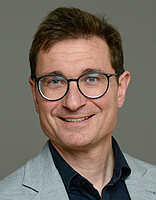Interview with Leopoldina Member Tobias Erb
“Without carbon, nothing is possible”

Professor Dr Tobias J. Erb
Image: Markus Scholz | Leopoldina
Can carbon dioxide be used as a future raw material source? Leopoldina Member Tobias Erb addressed this question in the public lecture as part of this year’s Life Science Symposium of Class II. The Director of the Max Planck Institute for Terrestrial Microbiology (Marburg/Germany) pursues the idea of obtaining carbon directly from CO₂. In the interview he outlines his thoughts on how we should be talking about a defossilisation of economy and society rather than a decarbonisation.
Last year you were accepted into the Leopoldina. What are you hoping from the membership?
Tobias Erb: The task of the Leopoldina is to promote science and give their voice to socially, ecologically and economically relevant topics. This is also true of my research. I find it equally important to emphasise the significance of fundamental research for innovation. Research must be free and able to be driven by knowledge and curiosity. I find many touch points and possibilities to be involved. For example, as a non-member of the Leopoldina, I already worked with the “Life Sciences” working group and I would like to continue being involved there.
In your research and now in your lecture you focus on carbon dioxide. Why is the greenhouse gas, in your opinion, a resource of the future?
Human life, whether its diet or the materials in the surrounding environment, is based on carbon. Without carbon, nothing is possible. We will, as a result, not be able to decarbonise as a society, but we will have to defossilise. That is an important distinction. The big vision is to directly obtain carbon from CO₂ and not from crude oil, in order to thus build up a CO₂-based sustainable economy. Synthetic biology can significantly contribute to this.
What can it offer?
Nature can already capture large amounts of CO₂ via photosynthesis. It does this however – from a human perspective – very inefficiently and via a complicated product, i.e. biomass. The approach of our working group was to radically rethink this process of CO₂ conversion and design it more efficiently. Synthetic biology opens up new possibilities that evolution has not yet attempted.
An example of this is artificial photosynthesis, one of the things you received the Leibniz Prize for at the start of the year. How does it work?
To start with there was the fundamental question of whether a primordial process such as photosynthesis can even be reinvented. First, we drafted various theoretical alternatives, which we then implemented in test tubes, and are now introducing to cells. You could say that we have developed a new operating system for photosynthesis. The exciting question is whether, after billions of years of evolution, natural cells can even run such new programmes – or whether artificial cells would be better suited.
You’re blindsiding evolution ...
People always assume evolution is very creative, when in fact it is very limited because in most cases it remains the same as what it had originally invented and only tries to optimise that. Evolution rarely succeeds at innovating. In synthetic biology it's easier for us: I can completely redesign a process like photosynthesis. This facet, developing something new which nature did not invent and to then test this in a living organism such as a cell, is the principle of our research.
Would you draw ethical lines in synthetic biology?
Humans have been interfering in nature for thousands of years and have changed it considerably. Synthetic biology mainly focuses on the depth and consequences of such interference, as well as specific application. In such conversations it would be important to me that the opportunities and risks of synthetic biology be worked out and discussed. The Leopoldina is an excellent place for this.
